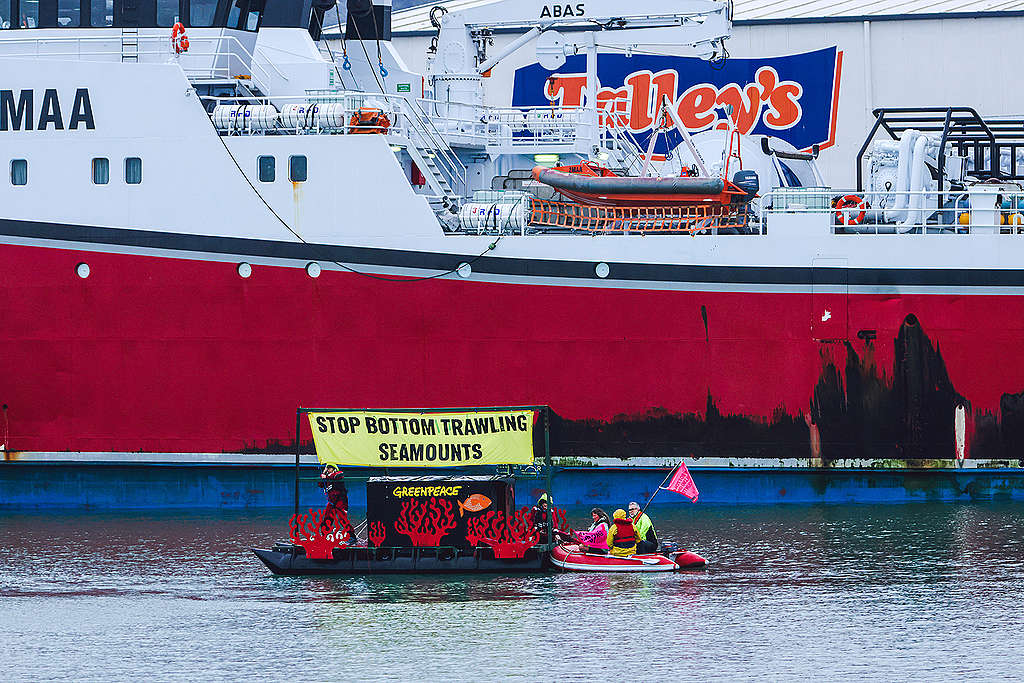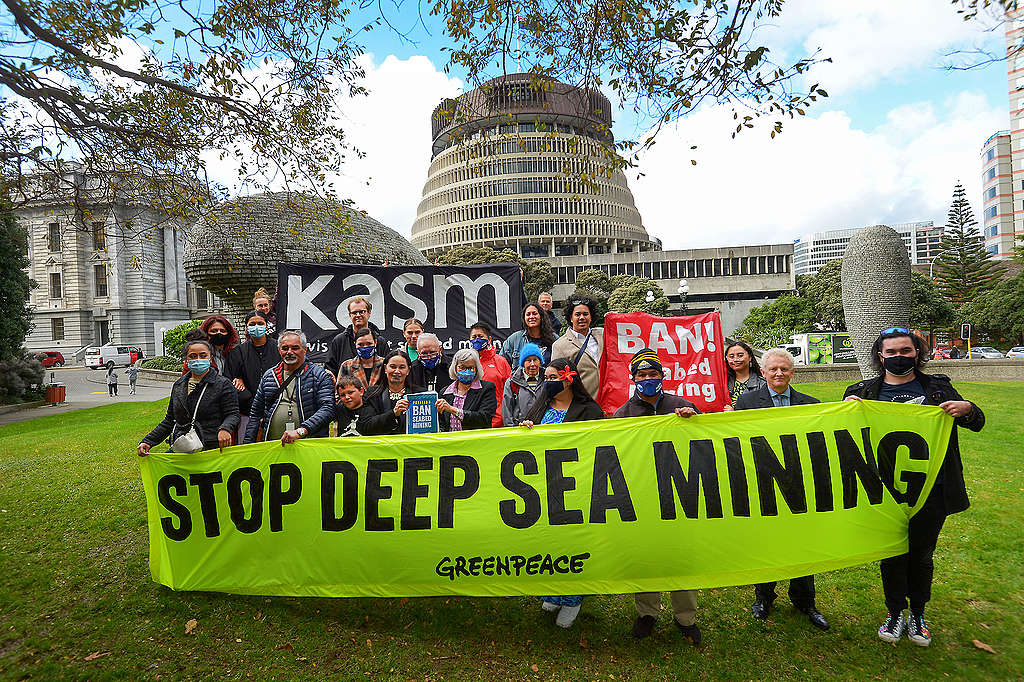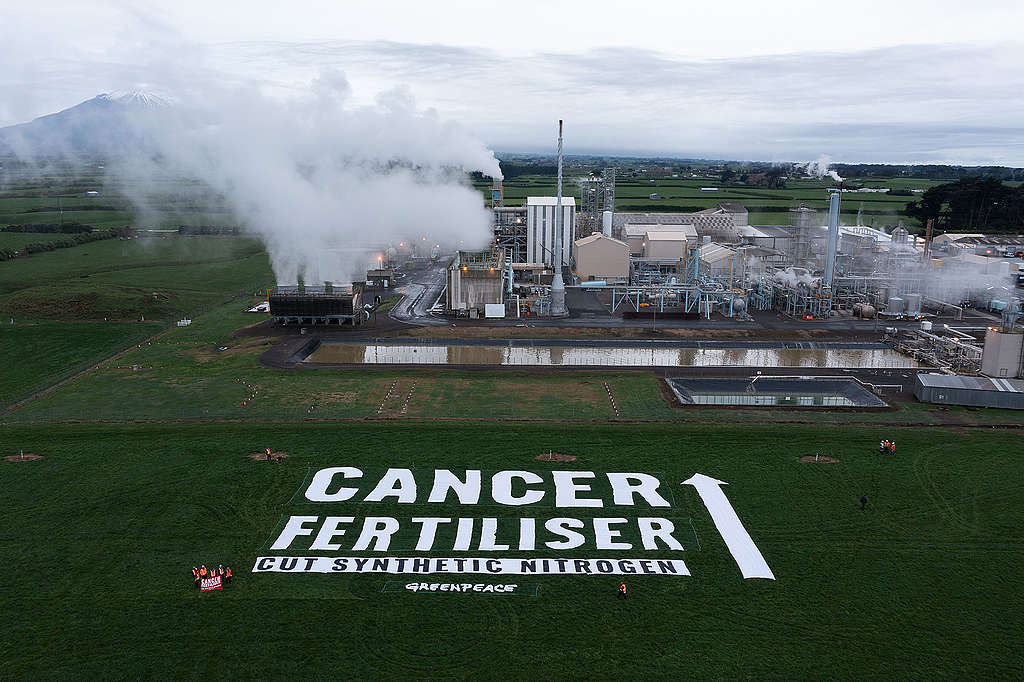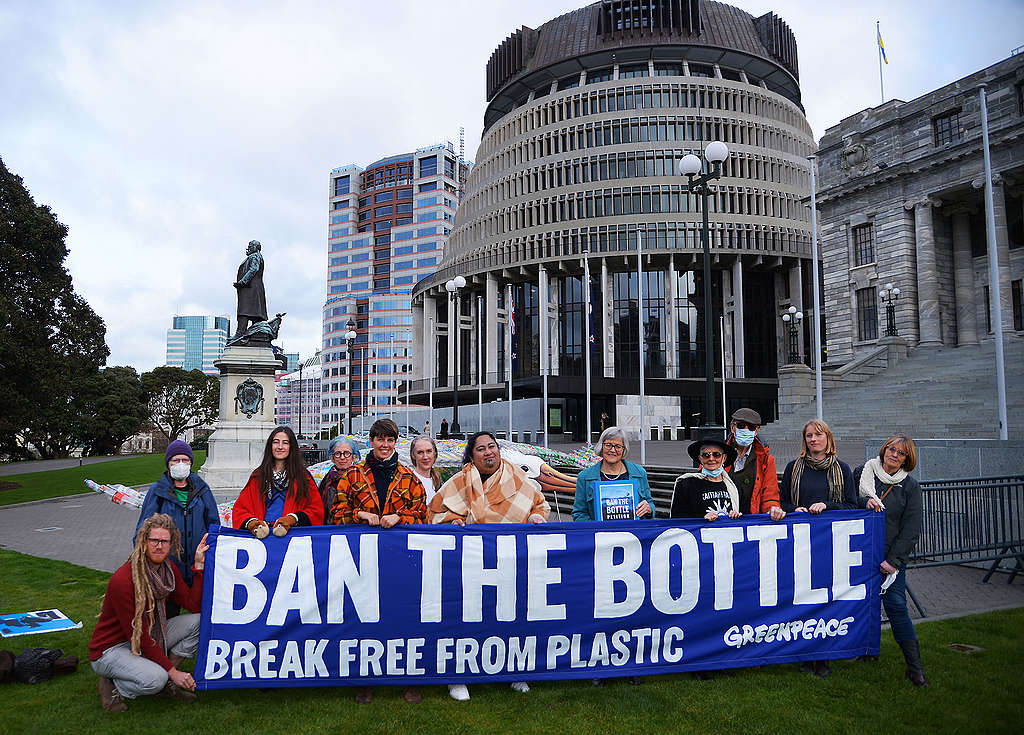Greenpeace Aotearoa is completely independent – so it’s only thanks to people like you that we can campaign for a green and peaceful future. Check out this issue of Kākāriki, here you can read the highlights of what you’ve made possible over the last few months.
You’re putting a stop to bottom trawling
Supporters like you are helping to bring this horrific fishing method to an end.
On July 30 in Nelson, activists Jess and Christine anchored their 6-metre long raft alongside a Talley’s trawler, the Amaltal Atlantis. Talley’s is a New Zealand-owned fishing company that bottom trawls on seamounts, incredible underwater mountains where ocean life congregates.
On their raft, Jess and Christine blocked the Amatal Altantis from leaving port to carry out destructive bottom trawling. They also displayed a banner that read “Stop Bottom Trawling Seamounts”.
Taking action against Talley’s is necessary to protect ocean biodiversity. Every year, Talley’s sends a fleet of vessels out to bottom trawl seamounts, destroying vulnerable coral habitats in the process. In the middle of the biodiversity crisis – bottom trawling seamounts is indefensible.
If you haven’t already, sign the petition against the commercial fishing industry’s greenwashing practices here.

You’re driving global ocean protection
For the past few years, supporters like you have powered our campaign for a strong UN Global Ocean Treaty. Unfortunately, at the last round of negotiations in August, talks failed to reach agreement on a treaty that could deliver ocean sanctuaries across 30% of the oceans by 2030, despite significant progress being made.
The negotiations have now been suspended, requiring a further round. But time is running out for the ocean – we urgently need a treaty that can deliver Ocean Sanctuaries that can protect 30% of the world’s oceans by 2030. About 11 million square kilometres of ocean must be protected annually between now and 2030 to protect 30% of the world’s oceans in the timescale scientists say is necessary. Further delay means more ocean destruction.
On the positive side, the New Zealand Government is now supporting a far stronger version of this Treaty than they were a few years ago. That’s in no small part due to your help using your voice and generosity to ensure we can keep pushing on this. We’ll continue to call on Prime Minister Jacinda Ardern and Foreign Affairs Minister Nanaia Mahuta to keep using their influence to persuade world leaders to keep the talks alive and finalise this vital agreement.
You’re protecting the seabed from mining corporations
On 8 June, we handed in our petition signed by over 35,000 New Zealanders like you, calling on Prime Minister Jacinda Ardern to ban seabed mining in Aotearoa. Kiwis Against Seabed Mining (KASM) and Greenpeace Aotearoa presented the petition to Green Party MP Eugenie Sage and Te Pāti Māori co-leader Debbie Ngarewa-Packer at Te Whare Pāremata (Parliament), surrounded by iwi and volunteer groups including Ngāti Ruanui, Oceanic Voices, the Deep Sea Conservation Coalition (DSCC) and Environment & Conservation Organisations of Aotearoa New Zealand (ECO).
Seabed mining is a new, and highly destructive industry that bulldozes the seafloor, releasing carbon and harming the ocean and the creatures who call it home.
Over the past decade, with the support of thousands of people, we’ve successfully fought off attempts by Trans Tasman Resources (TTR) to mine the seabed in Aotearoa’s waters – and we’ve won. We had to take it all the way to the Supreme Court, which quashed the 2017 Environmental Protection Authority’s green light for TTR to mine the South Taranaki Bight.
Throughout this process, it has become abundantly clear that this activity cannot take place in our waters without causing irrevocable harm. It threatens biodiversity – from the pygmy blue whales in the South Taranaki Bight to Māui dolphins and the little blue penguin – the kororā. It’s time for this government to draw a line in the seabed, and ban the activity altogether. With your help, we can make it happen!

You got cameras on boats!
In May, we celebrated an awesome victory for ocean protection and people power. After years of delays by successive governments – and fierce opposition from the commercial fishing industry – it was finally announced that 300 commercial fishing vessels will be fitted with cameras by the end of 2024. However, while this is a great step forward, we’ll keep pushing for cameras on the full fishing fleet of more than 1000 boats.
You’re helping secure safe drinking water
Everyone should be able to trust that the water from their tap is safe to drink. But synthetic nitrogen fertiliser – and the intensive dairying it enables – is causing alarmingly high levels of nitrate contamination in drinking water around Aotearoa. This endangers people’s health – and it’s not acceptable.
Scientists warn that nitrate in drinking water could be causing 100 cases of bowel cancer and 40 deaths per year in New Zealand. Rural communities on bore water are the most at risk.
With your support, we’ve been able to continue our free community water testing programme. In July, we visited the Waikato to offer locals the chance to test nitrate contamination levels in their water.
Thanks to your generosity, we were also able to confront the fertiliser industry directly. We took an enormous, 1500 sq metre banner and displayed it at the Kapuni fertiliser factory in South Taranaki. Reading ‘“Cancer Fertiliser – Cut Synthetic Nitrogen’’, the aim was to highlight the link between synthetic nitrogen fertiliser and health risks, as well as holding the fertiliser industry to account for the human harm it causes.
Sign the petition to ensure fertiliser companies are held responsible for their pollution here.

You’re taking action on plastic pollution
Have you been to the supermarket lately and noticed something a little different about Coca-Cola bottles?
That’s because some incredible supporters have been out and about brand jamming the Coke shelves, spreading the word about Coca Cola being the world’s number one plastic polluter.
On the eve of plastic free July, we also delivered our 100,000-strong petition asking the Government to ban single-use bottles to parliament. If you were one of the many New Zealanders that signed this petition, thank you!
We took ‘’Birdie’’, our giant toroa sculpture made of reclaimed plastic bottles, in honour of the memory of the toroa that was found in Nelson starving to death from swallowing a plastic bottle.
Your support means we can continue calling on the Government to ban single-use plastic bottles and incentivise reusable and refillable alternatives.

